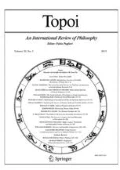Abstract
In “Divine Freedom,” I argue that morally significant incompatibilist freedom is a great good. So God possesses morally incompatibilist freedom. So, God can do wrong or at least can do worse than the best action He can do. So, God is not essentially morally perfect. After careful consideration of numerous objections, I conclude that this argument is undefeated.
Similar content being viewed by others
References
Copp D (2008) ‘Ought’ implies ‘Can’ and the derivation of the principle of alternate possibilities. Analysis 68(1):67–75
Frankfurt H (1969) Alternate possibilities and moral responsibility. J Philos 66:829–839
Ginet C (1983) A defense of incompatibilism. Philos Stud 44:391–400
Howard-Snyder D (2009) The puzzle of prayers of thanksgiving and praise. In: Nagasawa Y, Wielenberg E (eds) New waves in philosophy of religion. Palgrave MacMillan, New York, pp 125–149
Howard-Snyder D, Howard-Snyder F (1993) The christian theodicist’s appeal to love. Relig Stud 29(2):185–192
Howard-Snyder D, Howard-Snyder F (1996) The real problem of no best world. Faith Philos 13:422–425
Leftow B (1989) Necessary moral perfection. Pac Philos Q 70:240–260
Morriston W (2000) What’s so good about moral freedom? Philos Q 50(200):344–358
Pruss A (2008) The essential divine-perfection objection to the free-will defense. Relig Stud 44(4):433–444
Sennett J (1994) Is god essentially god? Relig Stud 30(3):295–303
Smith Q (1997) Ethical and religious thought in analytic philosophy of language. Yale University Press, New Haven
Speak D (2013) Free Will and Soul-Making Theodicies. In: McBrayer J, Howard-Snyder D (eds) The blackwell companion to the problem of evil. Wiley, Malden, pp 205–221
Swinburne R (1993) The coherence of theism. Clarendon Press, Oxford
Timpe K (2014) Free will in philosophical theology. Bloomsbury studies in philosophy of religion. Bloomsbury Academic, London
Van Inwagen P (1983) An essay on free will. Clarendon Press, Oxford
Warfield TA (2000) Causal determinism and human freedom are incompatible: A new argument for incompatibilism. Nous 34(Supplement 14):167–180
Widerker D (1991) Frankfurt on ‘Ought Implies Can’ and alternative possibilities. Analysis 51(4):222–224
Zangwill N (2003) Externalist moral motivation. Am Philos Q 40(2):143–154
Author information
Authors and Affiliations
Corresponding author
Rights and permissions
About this article
Cite this article
Howard-Snyder, F. Divine Freedom. Topoi 36, 651–656 (2017). https://doi.org/10.1007/s11245-016-9406-z
Published:
Issue Date:
DOI: https://doi.org/10.1007/s11245-016-9406-z


